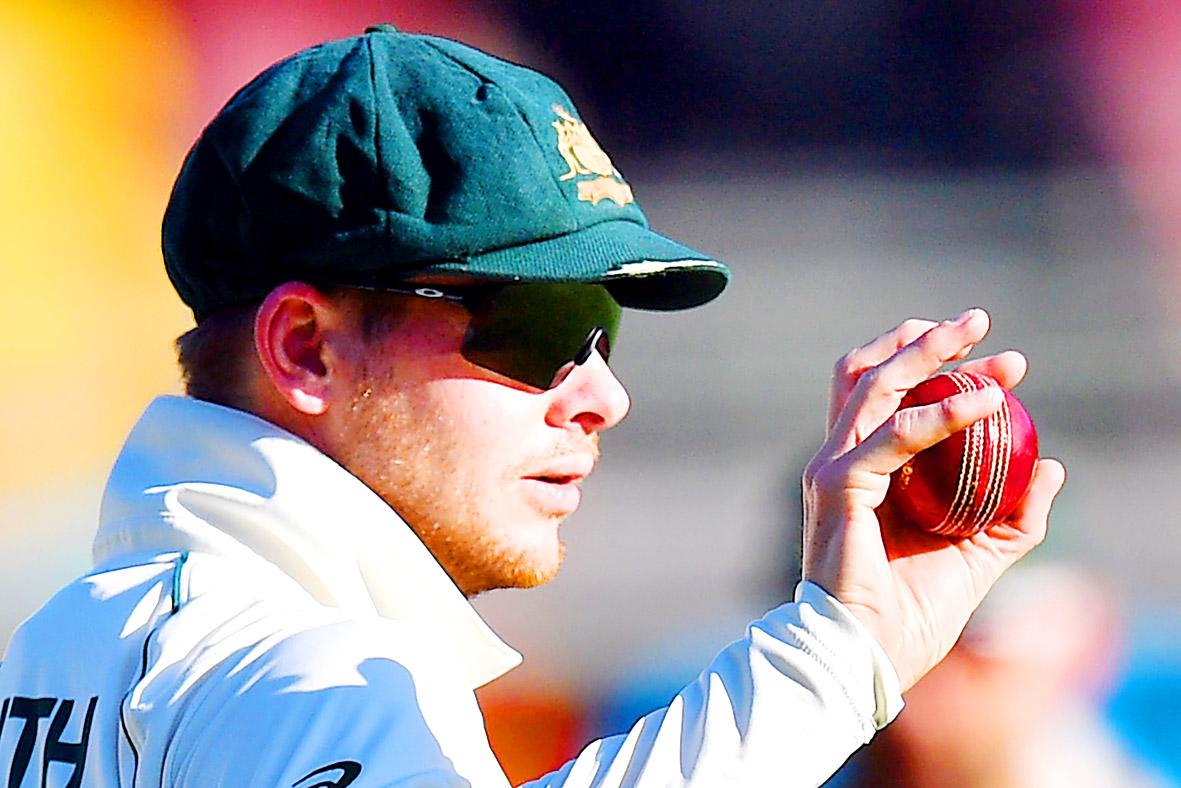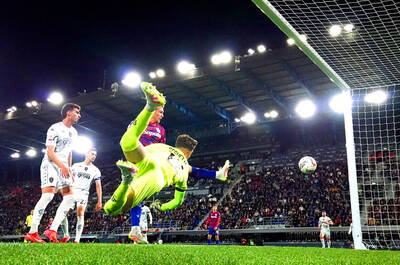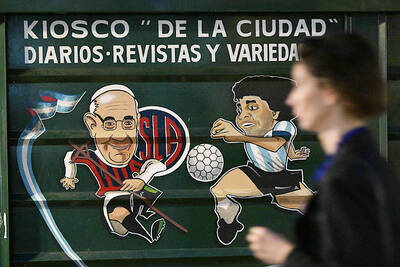Steve Smith’s two-year leadership ban ended yesterday, leaving him eligible again to captain Australia.
Smith was stripped of the captaincy and banned from leading Australia for two years over his involvement in the 2018 ball tampering scandal in South Africa.
Australia players were this week due to conclude a series of matches in New Zealand and, for some, to join the Indian Premier League.

Photo: AFP
However, it is not clear whether the IPL will take place this year and when international matches will resume. Australia’s scheduled tours to England and Bangladesh in the middle of the year are in doubt.
Smith told Channel Nine television’s Sports Sunday that he is doing his best to stay mentally and physically fit, training in his home gym, going on 10km runs and practising the guitar.
“It’s obviously not looking likely [the IPL will go ahead] at the moment,” Smith said. “I think there might be some meetings over the next few days to discuss what the go is with it all.”
“I’m just trying to stay physically and mentally fit and fresh and, if it goes ahead at some point, then great,” he said. “And if not, there’s plenty going on in the world at the moment. So just play it day by day.”
It seems unlikely Smith will return to the captaincy when cricket resumes. Tim Paine is firmly established as Australia’s Test captain and although he is 35, he is not immediately considering retirement. Aaron Finch has captained Australia successfully in white-ball cricket.
The conclusion of Smith’s ban ends the period of upheaval in Australian cricket that followed the ball tampering incident in the second Test in Cape Town, when Cameron Bancroft, with the knowledge of Smith and then-Australia vice captain David Warner, used sandpaper to change the condition of the ball.
Smith and Warner received one-year bans from international and most domestic cricket, while Bancroft was banned for nine months. The scandal also resulted in the resignation of coach Darren Lehmann and the departure of Cricket Australia chief executive James Sutherland.
Warner remains under a career-long leadership ban.

Bologna on Thursday advanced past Empoli to reach their first Coppa Italia final in more than half a century. Thijs Dallinga’s 87th-minute header earned Bologna a 2-1 win and his side advanced 5-1 on aggregate. Giovanni Fabbian opened the scoring for Bologna with a header seven minutes in. Then Viktor Kovalenko equalized for Empoli in the 30th minute by turning in a rebound to finish off a counterattack. Bologna won the first leg 3-0. In the May 14 final in Rome, Bologna are to face AC Milan, who eliminated city rivals Inter 4-1 on aggregate following a 3-0 win on Wednesday. Bologna last reached the

If the Wild finally break through and win their first playoff series in a decade, Minnesota’s top line likely will be the reason. They were all over the Golden Knights through the first two games of their NHL Western Conference quarter-finals series, which was 1-1 going back to Minnesota for Game 3 today. The Wild tied the series with a 5-2 win on Tuesday. Matt Boldy had three goals and an assist in the first two games, while Kirill Kaprizov produced two goals and three assists. Joel Eriksson Ek, who centers the line, has yet to get on the scoresheet. “I think the biggest

From a commemorative jersey to a stadium in his name, Argentine soccer organizers are planning a slew of tributes to their late “Captain” Pope Francis, eulogized as the ultimate team player. Tributes to the Argentine pontiff, a lifelong lover of the game, who died on Monday at the age of 88, have been peppered with soccer metaphors in his homeland. “Francisco. What a player,” the Argentine Football Federation (AFA) said, describing the first pope from Latin America and the southern hemisphere as a generational talent who “never hogged the ball” and who showed the world “the importance of having an Argentine captain,

Noelvi Marte on Sunday had seven RBIs and hit his first career grand slam with a drive off infielder Jorge Mateo, while Austin Wynn had a career-high six RBIs as the Cincinnati Reds scored their most runs in 26 years in a 24-2 rout of the Baltimore Orioles. Marte finished with five hits, including his eighth-inning homer off Mateo. Wynn hit a three-run homer in the ninth off catcher Gary Sanchez. Cincinnati scored its most runs since a 24-12 win against the Colorado Rockies on May 19, 1999, and finished with 25 hits. Baltimore allowed its most runs since a 30-3 loss to